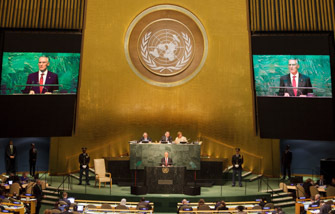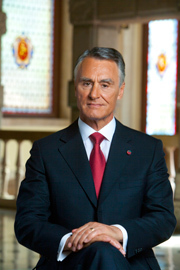
Click to enlarge.
PRESIDENT OF THE PORTUGUESE REPUBLIC
 Aníbal Cavaco Silva, born on 15 July 1939, in Boliqueime, Loulé (Algarve), is the 19th President of the Portuguese Republic, elected by universal suffrage in 2006 and re-elected in 2011, standing as an independent candidate.
Aníbal Cavaco Silva, born on 15 July 1939, in Boliqueime, Loulé (Algarve), is the 19th President of the Portuguese Republic, elected by universal suffrage in 2006 and re-elected in 2011, standing as an independent candidate.
Asserting that the challenges Portugal was facing demanded a presidency that encouraged wide consensus surrounding the major national objectives, Prof. Aníbal Cavaco Silva commenced his first mandate with the commitment to strengthen the links that bind the Portuguese while citizens of the same Republic and, equally, to exercise his office with total impartiality and independence towards the various party-political forces.
President Aníbal Cavaco Silva achieved two absolute majorities in legislative elections and exercised office as Prime Minister between 1985 and 1995.
He was proactive in the process of European construction, ensuring a central role in several great decisions, influencing the options written into the Maastricht Treaties and guaranteeing the accesion of the escudo to the European Monetary System, creating the conditions for the inclusion of Portugal in the first group of countries which adopted the single European currency.
He took part in 29 European Councils where he successfully defended Portugal’s interests, as was the case with the Delors Packages I and II, with PEDIP (Specific Programme for the Development of Portuguese Industry), and with the creation of specific support programmes for the development of the Azores and Madeira. In the first half of 1992, under his drive, Portugal took up, for the first time and with great success, its periodical role in the presidency of the European Union.
In relations with the Portuguese speaking world, Cavaco Silva promoted changes targeting the democratic stabilization of the African regimes, sponsoring Angolan peace negotiations and supporting similar process in Mozambique. It was also under his leadership that Portugal was at the centre of the creation of the Community of Portuguese Speaking Countries (CPLP) and that decisions were taken to hold annual Portuguese-Brazilian Summits.
Aníbal Cavaco Silva lent new dynamics to Portuguese foreign policy, strengthening Portugal’s proactive role in its bilateral and multilateral relations, as well as in several regional arenas.
Through annual Head of Government summit meetings, he improved relations with Spain, developing interchanges in a wide range of areas and a greater development of cross-border relations.
At the same time he helped to increase the role of the Portuguese communities scattered throughout the world in their countries of adoption, most of which he visited.
On 7 September 1995, when Aníbal Cavaco Silva was in office as Prime Minister, he was distinguished in Germany with the Carl Bertelsmann Prize that the Bertelsmann Foundation decided to award Portugal for its success in the improvement of the labour market and in the fight against unemployment. He was also awarded the Joseph Bech Prize (1991), in Luxembourg, and the Robert Schumann medal (1998), for his contribution towards European construction, and the Freedom Prize (1995), in Switzerland, by the Schmidheiny Foundation, for his actions as a politician and economist. He was distinguished, in Naples, with the Mediterranean Institutions Prize (2009), awarded by the Mediterranean Foundation, “as a recognition for his endeavours and actions in the strengthening of solidarity and of an active cooperation among the Mediterranean countries, on behalf of the promotion and development of Peace in that region”.
His vast published works include the books O Mercado Financeiro Português em 1966 (The Portuguese Financial Markets in 1996), Economic Effects of Public Debt, Política Orçamental e Estabilização Económica (Budget Policies and Economic Stabilization), A Política Económica do Governo de Sá Carneiro (Economic Policy in the Sá Carneiro Government), Finanças Públicas e Política Macroeconómica (Public Finances and Macroeconomic Policy), As Reformas da Década (The Reforms of the Decade), Portugal e a Moeda Única (Portugal and the Single Currency), União Monetária Europeia (The European Monetary Union), Autobiografia Política (Political Autobiography) Volumes I and II, and Crónicas de Uma Crise Anunciada (Chronicles of an Announced Crisis).
He was the Editor of the Economia Magazine, published by the Portuguese Catholic University, between 1977 and 1985.
His more relevant speeches as Prime Minister are published in his books Cumprir a Esperança (Fulfilling Hope) (1987), Construir a Modernidade (Constructing Modernity) (1989), Ganhar o Futuro (Conquering the Future) (1991), Afirmar Portugal no Mundo (Asserting Portugal in the World) (1993) and Manter o Rumo (Keeping on Course) (1995).
Leaving active political life between 1995 and 2005, a period during which he returned to academic activities, President Cavaco Silva kept up his remarkable civic involvement, specifically through his public approach on national and international issues.
From his first mandate as President of the Republic, his main addresses are included in five volumes entitled “Routes”.
Aníbal Cavaco Silva took a degree in Finance in the Lisbon Higher Institute of Economic and Financial Sciences (ISCEF), and holds a doctorate in Economics by York University, in the United Kingdom. He lectured at the ISCEF, was Professor in the Faculty of Economics in Lisbon New University and, at the time he was first elected President of the Republic, was a Professor In the Portuguese Catholic University.
He was a researcher in the Calouste Gulbenkian Foundation and headed the Bank of Portugal’s Economic Research Department, where he would later become a consultant. He was Minister of Finance and Planning in 1980-81, in the Government of Prime Minister Francisco Sá Carneiro, and was President of the National Council for the Plan between 1981 and 1984. He was President of the Social Democrat Party (PSD) between May 1985 and February 1995.
President Cavaco Silva was awrded honorary degrees by the University of York (United Kingdom), La Coruña (Spain), Goa (India), León (Spain) and Heriot-Watt (Edinburgh, Scotland), and is a member of the Royal Academy of Moral and Political Sciences of Spain, of the Madrid Club for Democratic Transition and Consolidation and of the Global Leadership Foundation.
Throughout his political life he was awarded several national and foreign decorations.
Aníbal Cavaco Silva did his national service as an Army officer between 1962 and 1965 in Lourenço Marques (now Maputo), Mozambique.
He is married to Maria Alves da Silva Cavaco Silva. They have two children and five grandchildren.
© 2006-2016 Presidency of the Portuguese Republic
You have gained access to the records of the Official Site of the Presidency of the Republic from 9 March 2006 to 9 March 2016.
The contents available here were entered in the site during the 10 year period covering the two mandates of President of the Republic Aníbal Cavaco Silva.